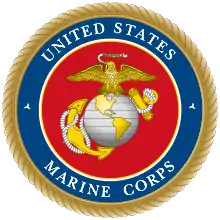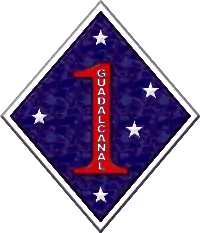1st Combat Engineer Battalion
1st Combat Engineer Battalion is a combat engineer battalion of the United States Marine Corps. The unit, nicknamed "The Super Breed", is based at Marine Corps Base Camp Pendleton, California and falls under the command of the 1st Marine Division and the I Marine Expeditionary Force.
| 1st Combat Engineer Battalion | |
|---|---|
 1st CEB insignia | |
| Active | 24 February 1941 – present |
| Country | |
| Branch | |
| Type | Combat Engineering |
| Size | 800 |
| Part of | 1st Marine Division I Marine Expeditionary Force |
| Garrison/HQ | Marine Corps Base Camp Pendleton |
| Nickname(s) | The Super Breed |
| Engagements | World War II
Korean War |
| Commanders | |
| Current commander | LtCol Seth E. Dewey |
Mission
Provide mobility, counter mobility, survivability, and limited general engineering support to the 1st Marine Division.
Current units
- Headquarters and Service Company
- Company A (rein)
- Company B (rein)
- Company C (rein)
- Mobility Assault Company
- Engineer Support Company
History
World War II
The battalion was formed on 24 February 1941 at Guantanamo Bay, Cuba, as the 1st Pioneer Battalion,[1] 1st Marine Division to be a specialized unit to conduct shore party operations during amphibious assaults, and to provide close combat engineer support to the Marine infantry.[2] The average age of the enlisted men was about 18, and they referred to themselves as "draft dodgers" because all were volunteers. They relocated during April 1941 to Marine Corps Recruit Depot Parris Island, South Carolina and again in September 1941 to "Tent City One" at Marine Corps Air Station New River, North Carolina
On 14 June 1942 the battalion traveled by a five-day train journey to San Francisco, with the final destination of Wellington, New Zealand which was not disclosed to personnel at the time.[3] The sail to New Zealand was on the USAT John Ericsson (NY-307), a former Swedish deluxe cruise liner the S.S. Kungsholms, departing from the Oakland Naval Base.[4] They were redesignated on 12 January 1943 as the 1st Battalion, 17th Marines and again on 30 June 1944 as the First Engineer Battalion
The battalion participated in combat during the Battle of Guadalcanal, Eastern New Guinea, Battle of New Britain, Battle of Peleliu and the Battle of Okinawa. Following the war they were sent to Tientsin, China in September 1945 as peacekeepers and returned to the United States during June 1947 to Camp Pendleton, California
Korean War
The battalion deployed during August 1950 to Kobe, Japan, joining the 1st Provisional Marine Brigade they were then sent in September 1950 to Inchon, Korea, and joined the 1st Marine Division.
During the war they participated in the following battles:
- Battle of Pusan Perimeter
- Battle of Inchon-Seoul
- Battle of Chosin Reservoir
- East-Central Front
- Western Front
Following the armistice the battalion participated in the defense of the Korean Demilitarized Zone from August 1953 – April 1955. They returned to Camp Pendleton, California in April 1955 and were again redesignated on 1 May 1957 as the 1st Pioneer Battalion.
Vietnam War
The battalion was again redesignated on 1 May 1963 as the 1st Engineer Battalion and departed San Diego Harbor with the 7th Marine Regiment (RLT-7) on WW-II Troop Ships USS Pickaway (APA-222) and USS Renville (APA-227) on 23 May 1965 for Camp Hansen, Okinawa, with a brief stop-over at Pearl Harbor Hawaii. From Okinawa they deployed to Qui-Nhon SVN, landing there on 06-7 July 1965. On 10 November 1965 7th Marines re-deployed to Chu Lai in the Republic of Vietnam. One Marine was lost on the USS Renville while en route to Hawaii due to appendicitis which was misdiagnosed as sea-sickness.
During the Vietnam War the 1st Engineer Battalion supported 1st, 2nd, and 3rd Battalions of the 1st 5th and 7th Marines in combat operations from July 1965 through April 1971, operating from Qui-Nhon, Chu-Lai and Da-Nang, the most famous of which was Operation "Starlight" conducted August 1965 where Sgt. Robert E. O'Malley was awarded the first Marine Corps Medal of Honor of the Vietnam War.
1980s and 1990s
The battalion participated in Operations Desert Shield and Desert Storm in Southwest Asia from August 1990 until March 1991. In May 1992, the unit was brought out to conduct riot control operations in the city and county of Los Angeles during the 1992 Los Angeles riots. They would later take part in Operation Restore Hope in Somalia from December 1992 – February 1993. Elements would participate in Fire-Fighting efforts in the Western United States during August and September 1994.
Global War on Terror
The battalion has participated in Operation Iraqi Freedom from March 2003 until the present. The battalion headquarters and 3 engineer companies were deployed to Afghanistan in 2009 as part of the NATO counterinsurgency offensive in the Helmand Province, to Musa Qal’eh in 2010,[5] and returned again, 2011 and 2013 .
Unit awards
A unit citation or commendation is an award bestowed upon an organization for the action cited. Members of the unit who participated in said actions are allowed to wear on their uniforms the awarded unit citation. 1st CEB has been presented with the following awards:
| Ribbon | Unit Award |
| Presidential Unit Citation one Silver and two Bronze Stars | |
| Joint Meritorious Unit Award | |
| Navy Unit Commendation with one Bronze Star | |
| Meritorious Unit Commendation with one Bronze Stars | |
| American Defense Service Medal | |
| Asiatic-Pacific Campaign Medal with four Bronze Stars | |
| World War II Victory Medal | |
| Navy Occupation Service Medal with Asia clasp | |
| National Defense Service Medal with two Bronze Stars | |
| China Service Medal | |
| Korean Service Medal with two Bronze Stars | |
| Armed Forces Expeditionary Medal | |
| Vietnam Service Medal with two Bronze Stars | |
| Southwest Asia Service Medal with two Bronze Stars | |
| Korean Presidential unit Citation | |
| Vietnam Cross of Gallantry with Palm Streamer | |
| Vietnam Meritorious Unit Citation Civil Action Medal | |
| Iraq Campaign Medal | |
| Global War on Terrorism Expeditionary Medal | |
| Global War on Terrorism Service Medal |
See also
Notes
- commanded by Colonel George R. Rowan
- Lane, Guadalcanal, p.36
- Lane, Guadalcanal, p.38,40
- p.41, Lane
- Cpl. John McCall. "Marine engineers build outpost after clearing insurgents from town". Archived from the original on 13 August 2014. Retrieved 12 August 2014.
References
- Lane, Kerry, Guadalcanal Marine, University Press of Mississippi, 2004
 This article incorporates public domain material from websites or documents of the United States Marine Corps.
This article incorporates public domain material from websites or documents of the United States Marine Corps.
Web

